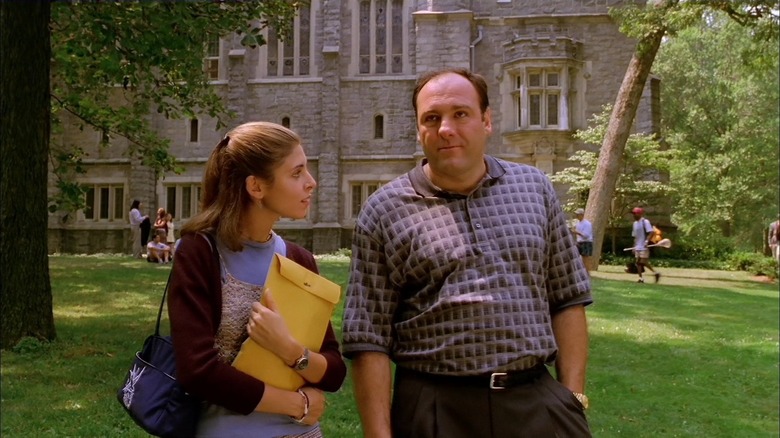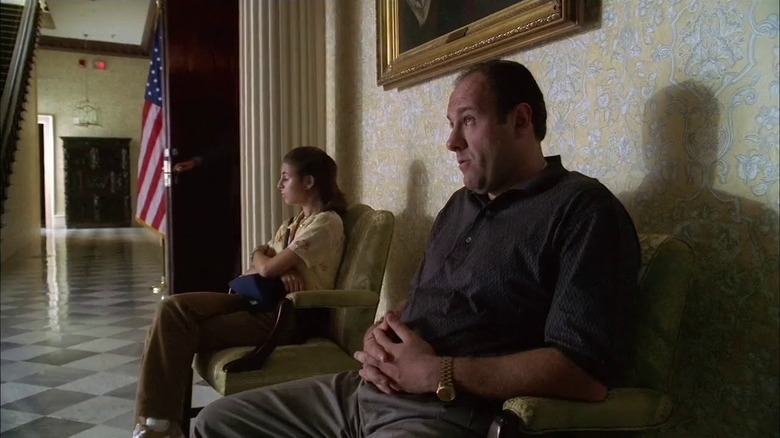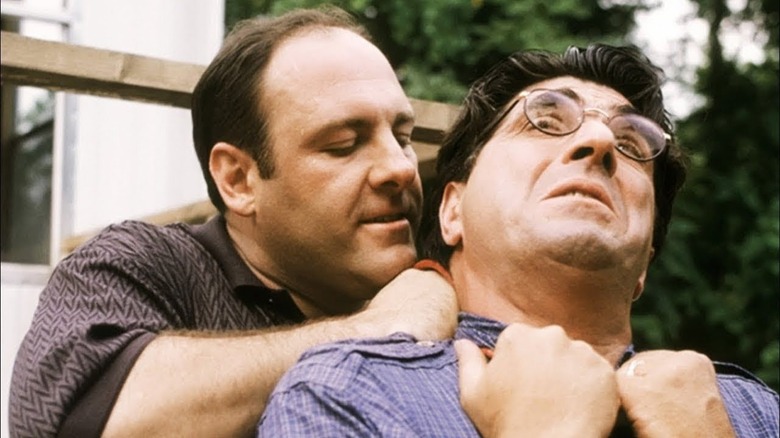The Make-Or-Break Moment For Tony's Character Came Early In The Sopranos
For the 20th anniversary of "The Sopranos," creator David Chase talked about the times he clashed with HBO. The network did not like the title "The Sopranos" because it caused some confusion over what kind of show it would be, but what troubled them the most was the fifth episode in the first season, "College," which critics now regard as one of the greatest in both the series and television history. While taking Meadow on college tours, Tony spots a rat who entered witness protection, Fabian "Febby" Petrulio, and brutally strangles him. "College" is a crucial narrative turning point because it is the first time the audience witnesses Tony kill someone. Chase describes HBO's initial reaction to the scene:
"I got a call from Chris Albrecht, who ran HBO, screaming about, 'How could you do this?! You've created one of the most dynamic characters of the past 20 years, and you're just going to ruin him. You're going to kill him right now because he kills that guy!' ... And I said 'Chris, he's a captain of a crew, and he comes upon a guy who was a rat. If he doesn't kill that guy, the show's over.'"
Albrecht was afraid audiences would find Tony irredeemable; he did not anticipate that viewers would be so invested in such a complicated and vicious protagonist. "College" establishes the series' willingness to buck television traditions, and the murder scene significantly impacts Tony's characterization and "The Sopranos" legacy.
The two Tonys
"College" is an essential episode because it artfully examines the themes of familial duty and loyalty that carry the rest of the series. At one point, Tony sits at Bowdoin College and reads a Nathaniel Hawthorne quote: "No man can wear one face to himself and another to the multitude, without finally getting bewildered as to which one may be true," a clear reference to Tony's good and evil sides. Tony wrestles with his dual identities as a vulnerable father figure and savage underworld criminal and attempts to reconcile the two in therapy, searching for a self-awareness that may never be found.
The episode smashes the disparate worlds together as Tony is torn between bonding with his daughter and looking out for his Mafia family. By the end of the episode, we see a terrifying side of Tony. Director Allen Coulter films Petrulio's death in uncomfortably tight close-ups as Tony gleefully tightens the rope, which digs into his tomato-red neck. Coulter shoots from below so Tony looms over the frame as a formidable, cold-blooded killer. Former HBO Entertainment President Carolyn Strauss elaborated on the scene's importance:
"For David, killing that guy and us seeing it was very complex, compelling and truly authentic. David was very strong in his belief that you can't just show this guy as an affable family man. He was a real killer too and everybody needed to feel 360 degrees of Tony and not just some cuddly side of him, and it is this revelation that worked so well."
All of Tony Soprano's grotesque qualities are laid bare in "College," cementing him as a multifaceted protagonist that fascinated audiences for years to come.
Establishing the antihero archetype
"College" is also notable for sparking the wave of antihero protagonists in prestige dramas. Shows like "Mad Men" and "Breaking Bad" immerse viewers in the psychological conflicts of a main male character who commits selfish, sometimes vile acts that are motivated by family, work, or wanting a better life. By putting you inside their minds — their traumatic memories, big dreams, and deepest fears — you understand and empathize with him in spite of their wrongdoings. The characters are also haunted by the discrepancy between their role in society and internal life. Carolyn Strauss explained that HBO was taking a gamble portraying this new kind of antihero:
"There was that anxiety of the bad guy as your leading man. Would he be able to come from back from strangling another man to death? ... Back then, the conventional wisdom was that everybody had to be likable. We tried not to be slaves to conventional wisdom, but still, the residue remained. It took a while before we were able to exhale and realize people will still watch."
With Petrulio's malicious murder, Chase invited viewers on an intense, ugly journey into Tony Soprano's thorny life. HBO feared audiences would be too repulsed by his sadistic character, but to their surprise, they were completely along for the ride. "College" is a bold and unforgettable episode that changed the face of television. It revolutionized the kind of stories being told and what kind of people they were about.


